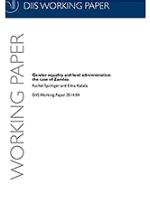Women’s land rights in between privatization and customary land rights
Gender and Land policies provide for the allocation of land to women - but have little impact on the ground
In Zambia, women and men do not have equal rights in terms of land ownership.
On statutory land, the Lands Act is gender neutral, but in practice, it is more difficult for women to acquire land than for men.
Customary law, although not unified and diverse among the 73 ethnic groups present in Zambia, is seen as on the whole discriminatory against women – in particular with regard to land ownership. Women mostly access land through membership in a household or kin.
A gender policy and two subsequent land policies have already aimed to redress gender inequality by providing for women to be allocated 30% of the land. However, this has not been implemented in practice.
Zambia seems to be at an important juncture, as government has recently proposed a codification of customary law, especially with regard to land. It is not clear when this will actually take place, and unclear also how gender inequality will be tackled by this government initiative.
Laws on inheritance have tried to redress unequal land succession rights; however, implementation and enforcement of these laws lag behind, compounded by the fact that statutory law allows for customary law to prevail in matters of customary land.
Moreover, land institutions are often not be accessible for women.
This paper is part of a series on gender equality and land administration within the ReCom framework
It discusses Zambia’s dual land tenure system, the ways in which gender issues have been incorporated in legal and policy documents, and the extent to which this has been reflected in practice. It also examines the role of donors in legal and policy processes and donor support to civil society in relation to women’s land rights.


